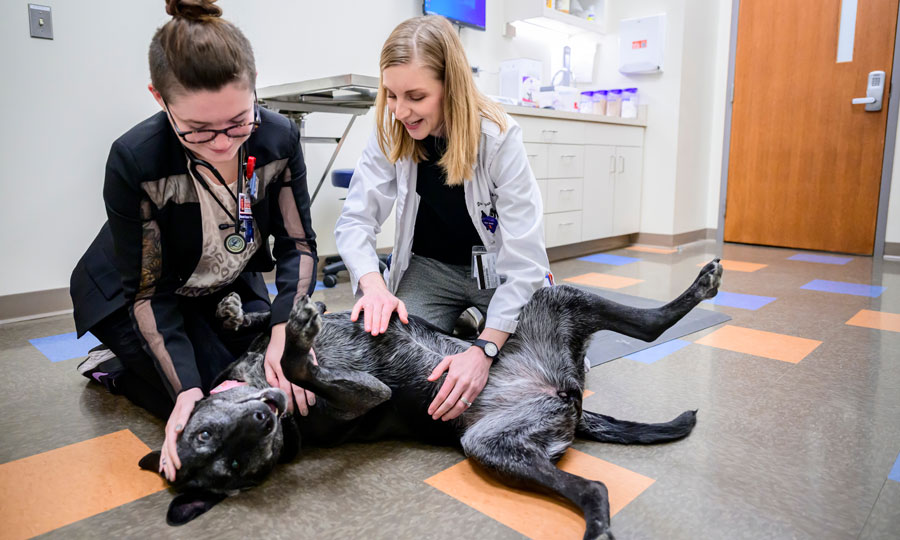Adding a new four-legged member to your family? Dr. Alyssa Baratta-Martin, a primary care veterinarian at the University of Illinois Veterinary Medicine South Clinic in Urbana, explains what owners will likely encounter when bringing their puppy for a first visit to the veterinarian.
Calling the Shots
Vaccinations provide your puppy with the best protection against dangerous diseases. According to Dr. Baratta-Martin, the “core” vaccines include the distemper combination—which protects against distemper, adenovirus, parvovirus, and parainfluenza—and the rabies vaccine.
“These viruses can be incredibly infectious and lead to fatal diseases for puppies as well as adult dogs who have not been fully vaccinated or who have weakened immune systems,” says Dr. Baratta-Martin. Furthermore, Illinois state law requires a rabies vaccination for all dogs by age 16 weeks.
Additionally, there are non-core or “lifestyle dependent” vaccines, and these include leptospirosis, Lyme, and bordetella. It is important to note that dogs who go hiking/camping, hunting, or to daycare/boarding facilities are at an increased risk for these diseases. Dr. Baratta-Martin recommends that all dogs receive these non-core vaccines due to known exposure risks in this area of Illinois.
To fully protect your puppy, multiple additional shots, or boosters, are needed. “While puppies are born with antibodies against disease that they received from their mom, the maternal antibodies fade in the first few months,” says Dr. Baratta-Martin. “Therefore, certain vaccines should be boostered multiple times until your puppy is about 17 weeks of age.” The vaccination schedule ensures that your puppy has no gaps in protection against these diseases as the maternal antibodies go away.
Prevent Puppy Parasites
Your veterinarian will also recommend testing a sample of your puppy’s poop for parasites and beginning heartworm and flea/tick prevention.
“Parasites can cause poor weight gain and anemia. In severe cases, they can be fatal,” says Dr. Baratta-Martin. “Some parasites spread from dogs to humans, so preventing them will protect human family members as well.”
To prevent diseases carried by these parasites, heartworm and flea/tick prevention should start when your puppy is around 8 weeks of age and of appropriate size. Dr. Baratta-Martin advises year-round use of parasite prevention in Illinois, where dogs can get heartworm disease, fleas, and ticks at any time.
Tailoring Diet and Reproductive Needs to Your Puppy
When it comes to decisions about your puppy’s diet and when to spay/neuter him or her, Dr. Baratta-Martin recommends a discussion with your veterinarian. These decisions vary according to the puppy’s breed and size.
“Generally speaking, puppies should be on a diet formulated for growth until they are a year old,” she says. “When making a transition in the diet, try to introduce the new food gradually over the course of 10 to 14 days to avoid stomach upset.”
Dr. Baratta Martin believes you should have a detailed conversation with your primary care veterinarian about spaying and neutering your puppy. She advocates for these procedures, which can prevent unwanted outcomes like urine marking, roaming, and pregnancy, as well as diseases including uterine infections, mammary tumors, and testicular tumors.
Positive Behavioral Training
Perhaps one of the most demanding—but also most rewarding—aspects of having a new puppy is successfully training them.
“Start by working on basic commands, such as “sit,” “stay,” “down,” and “come,” in short sessions for 5 to 10 minutes at a time,” advises Dr. Baratta-Martin. “When they do the command correctly, immediately give the puppy a small treat and praise so they associate the command with their actions.”
She emphasizes the importance of repetition and continuing to add in new commands or expand on routine commands in new settings. In addition to this, she recommends joining a puppy obedience class to expose your puppy to new situations, other dogs, and people in a controlled environment.
Make Veterinary Visits Fun
As you bring your puppy for its veterinary visits, it is a great idea to bring along their favorite toys or treats. “We want these first visits to be as happy as possible, and we like to use lots of high-value snacks and praise as well as going slow and giving the puppies breaks when needed,” says Dr. Baratta-Martin.
The goal is to establish a trusted partnership with your veterinary care team. By starting that relationship on a positive note with your puppy, you set the stage for a long, healthy, and happy life together with your new family member.
By Sarah Brink
Photo by Veronica Lopez, showing Arnie, an 8-week-old English bulldog, getting a nail trim from veterinary technician Olivia while veterinary assistant Diana distracts him with some delicious cheese on a stick during a visit to the University of Illinois Medical District Veterinary Clinic.




